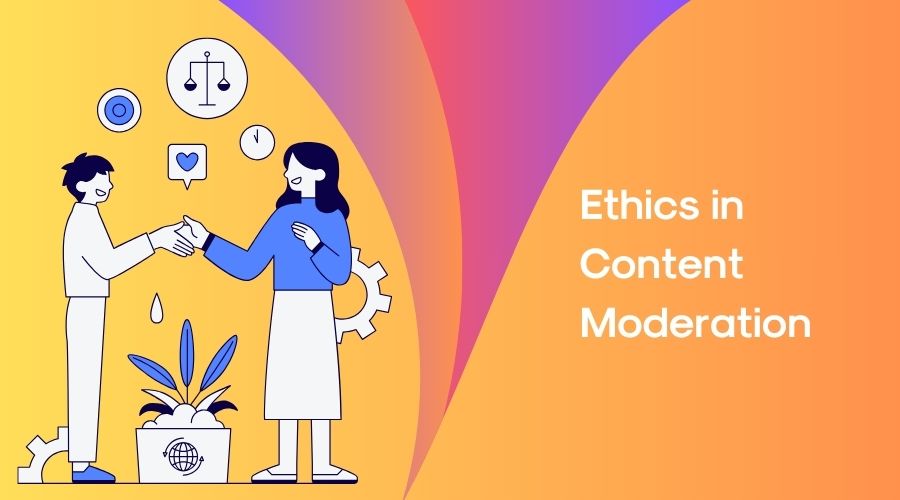Content moderation isn’t just about keeping the peace; it’s about navigating the complex, messy world of human interaction in the digital age. With billions of users posting, commenting, and sharing daily, platforms must balance freedom of expression with safety, fairness, and accountability. Ethics in Content Moderation affect trust, reputation and societal norms and hence is critical.
“Moderation is the art of letting people dance while ensuring no one steps on another’s toes—or sets the place on fire.”
Why Ethics Matter in Content Moderation
Moderation decisions shape how users experience digital spaces. These decisions affect trust, reputation, and societal norms. Here’s why getting it right is critical:
1. Balancing Free Speech with Safety
Free speech is vital, but it doesn’t come without limits. Misinformation, hate speech, and harmful content blur the lines. Platforms must answer tough questions: How do you protect dialogue without enabling harm? Where do you draw the line?
- Fact: 77% of Americans think major platforms should remove offensive or inaccurate posts, according to a Pew Research Center
2. Transparency and Accountability
Decisions that seem arbitrary can alienate users. Transparency in moderation policies and practices is vital for fostering trust and ensuring accountability.
- Example: Facebook’s Community Standards Enforcement Reports detail how content is flagged and removed, creating a framework for accountability.
3. Respecting Cultural and Regional Sensitivities
What works in one region might offend in another. Platforms must adapt to diverse cultural contexts without compromising fairness or consistency.
- Insight: A study by Oxford Internet Institute found that content flagged as offensive in Western countries often remained acceptable in parts of Asia and Africa.
Key Ethical Challenges in Content Moderation
1. Bias in Moderation Decisions
Algorithms and humans bring inherent biases.
- AI Bias: Algorithms can reflect the prejudices of their training data, disproportionately targeting specific groups.
- Human Bias: Moderators’ cultural, political, or personal beliefs can skew decisions.
- Example: A 2020 study revealed that AI tools for hate speech detection were 1.5 times more likely to flag tweets from Black users as offensive.
2. The Over-Moderation vs. Under-Moderation Dilemma
Striking a balance is tricky:
- Over-Moderation: Stifles creativity and legitimate discourse, leading to accusations of censorship.
- Under-Moderation: Lets harmful content spread, endangering users and eroding trust.
3. Transparency in AI Decision-Making
AI moderation works at scale but often lacks explainability. Users need clarity on why their content was flagged or removed.
4. Protecting the Protectors
Content moderators face psychological strain from constant exposure to graphic, violent, or hateful material. Their well-being must be a priority.
- Fact: A 2021 report by The Verge revealed that 50% of moderators experienced PTSD-like symptoms from their work.
Best Practices for Ethics in Content Moderation
1. Build Clear and Inclusive Guidelines
Community guidelines should be:
- Inclusive: Developed with input from diverse voices.
- Specific: Clearly outline acceptable and unacceptable behaviors.
- Accessible: Easy for users to find and understand.
- Dynamic: Regularly updated to reflect changing norms and issues.
2. Use AI Responsibly and Transparently
AI can scale moderation, but it’s no silver bullet.
- Train algorithms on diverse datasets to minimize biases.
- Implement feedback loops to refine AI decisions.
- Share how AI works and its limitations with users.
3. Foster Transparency at Every Stage
Transparency builds trust.
- Publish moderation reports, including data on flagged content.
- Offer clear explanations for content removals or user bans.
- Provide a robust appeals process for disputed decisions.
4. Prioritize Moderator Mental Health
Protecting your moderators protects your platform.
- Automate high-risk tasks to reduce exposure to harmful content.
- Offer counseling, therapy, and wellness programs.
- Rotate tasks to avoid burnout.
How Fusion CX Leads in Ethical Moderation
At Fusion CX, we’re rewriting the rules of content moderation to prioritize ethics and effectiveness. Here’s what sets us apart:
- Tailored Guidelines: We work with clients to craft community standards that reflect their unique values and user base.
- Empathy-Driven Decisions: Our moderators are trained to handle complex scenarios with cultural sensitivity and fairness.
- AI-Human Collaboration: Advanced AI handles high-volume tasks, while human moderators tackle nuanced cases.
- Mental Health Support: Our comprehensive wellness programs ensure our teams remain resilient and effective.
Real-World Examples of Ethics in Content Moderation
- YouTube: Combines AI with human reviewers to moderate over 500 hours of content uploaded every minute.
- Reddit: Empowers community moderators to enforce rules tailored to individual subreddits while adhering to overarching platform policies.
- Fusion CX: Delivers scalable moderation solutions that balance efficiency with empathy, ensuring every decision is grounded in fairness.
The Path Forward: Building Ethical Digital Spaces
Ethical content moderation is about more than rules; it’s about fostering trust, inclusivity, and safety. By embracing transparency, prioritizing fairness, and supporting moderators, platforms can navigate the ethical complexities of today’s digital landscape.
“Moderation isn’t about silencing voices; it’s about ensuring every voice has its rightful place in the conversation.”
Ready to make ethics a cornerstone of your content moderation strategy? Contact Fusion CX today and let’s create safer, more inclusive digital communities together.

